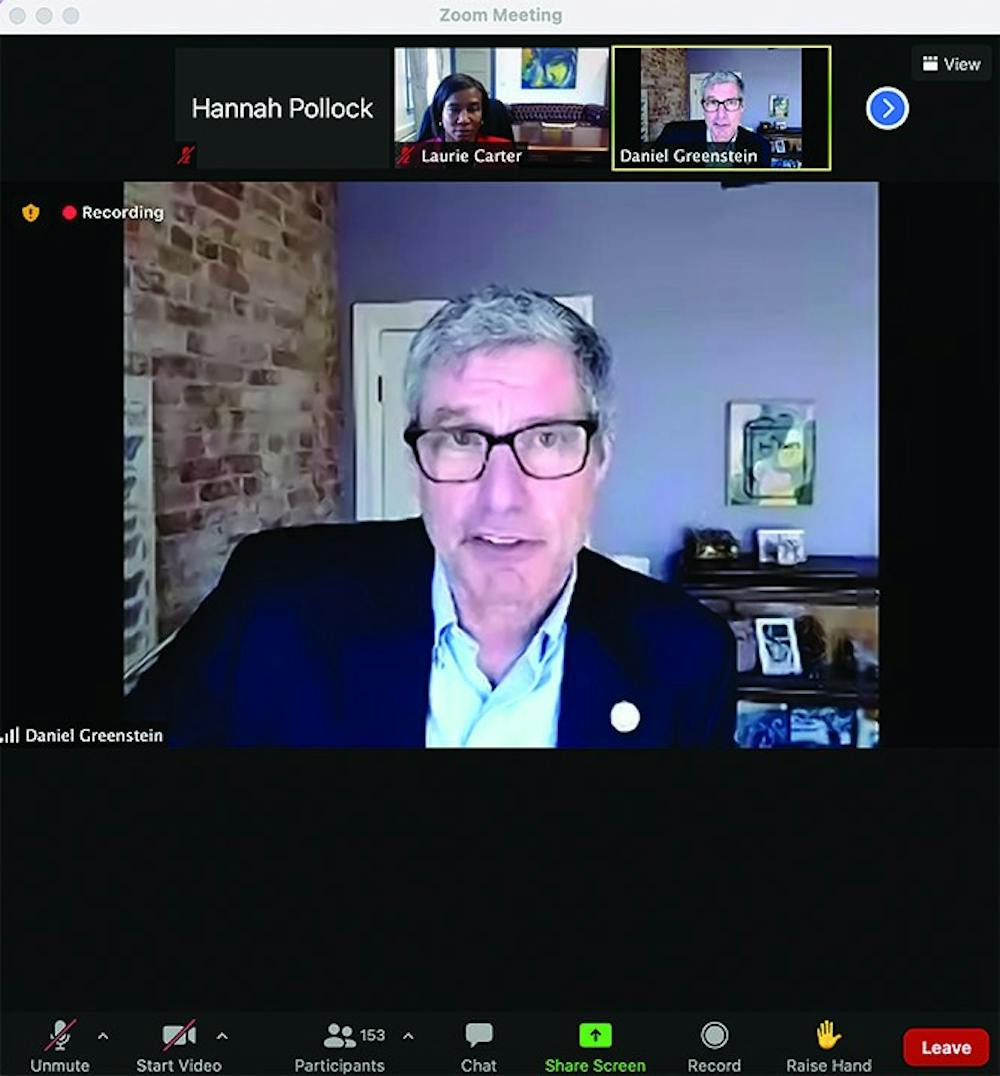In a virtual meeting at Shippensburg University Monday afternoon, Pennsylvania State System of Higher Education (PASSHE) Chancellor Daniel Greenstein said there are no plans to consolidate SU with another campus.
SU President Laurie Carter opened the meeting that at times became contentious by welcoming the chancellor and addressing “the elephant in the room.” She thanked the SU community for its words of congratulations and support during her tenure at the university.
“It has truly been the honor of my professional life to spend this time with you. I look forward to finishing strong these next few months,” Carter said. “But I am here until the end of the semester and I know that you will continue the good work that we have been doing at Ship. We have been turning the Ship around and sailing in the right direction.
“Now is not a time to let up,” Carter said, before transitioning into a sarcastic tone. “It is not a time to say, ‘Woohoo, she’s leaving, so we don’t have to work as hard.’”
Carter’s tone became serious, “Well, we will have to continue to work as hard. And I am with you every step of the way.”
Carter then introduced the chancellor, who answered the one question on the top of a lot of attendees’ minds with his first statement.
“There are no plans to consolidate Ship,” Greenstein said.
He repeated the statement and noted that there is an interim president search process outlined in Board of Governors and university policy. Greenstein said there will be more information available after the April PASSHE Board of Governors meeting.
“The next several years are as challenging everywhere in higher education. It isn’t clear, the trajectory for any university or college coming out of this pandemic,” Greenstein said. “There’s a lot of unknowns…” Greenstein said he believes that the pandemic has accelerated changes that had already begun.
He summarized his perspective of the state of higher education and PASSHE before moving into a question-and-answer format discussion.
Kara Laskowski, Association of Pennsylvania State College and University Faculties (APSCUF) Shippensburg University chapter president and SU human communication studies professor, noted the “point of change” the university finds itself at, alluding to “both internal and external issues” in which the university will contend. She asked a question about financial sustainability.
“Chancellor Greenstein, we’ve heard you say frequently that it is not possible to cut our way to sustainability. Yet, here at Ship, that is exactly the model that has been allowed and permitted,” Laskowski said. “And I would say, actually, the one that we have been forced to adopt. We have cut faculty, we have cut programs, we have cut support services. All of these things have a negative influence and a negative outcome on the morale, the burnout rate and most importantly, on our students on this campus.”
“What meaningful and significant investment has the state system made in Shippensburg University that will allow us to grow to reach our potential,” Laskowski asked.
Greenstein replied,“All the money that the system has, is funding from the state, and it’s allocated to the universities on the basis of the formula.”
The Board of Governors created the formula and SU is currently favored, according to Greenstein. He said the university receives about $1.5 million more than other universities because it is “funded at a higher rate per student than average.”
Laskowski also called for additional funding for students of color and initiatives like the Frederick Douglass Institute Scholars, who will help diversify the faculty and create a more welcoming environment for first-generation students and students of color.
Jose Ricardo, global languages professor, mentioned that although Greenstein had confirmed the university would not be integrated, Shippensburg may not be able to meet indicators, like a faculty to student ratio, that officials have previously used to make cuts. He asked what faculty members should expect if this happens.
Greenstein responded by first saying that integration is not a form of penalty, “It’s not like, you know, universities getting in financial trouble and they’re integrating. It really is about expanding opportunity,” Greenstein said.
The conversation moved into discussion about data, using specific data tools to make decisions and the accuracy of data collection. The chancellor and other officials said they did not come prepared to talk specifically about certain measures.
Carter closed the meeting by encouraging campus community members that Shippensburg is “on track” and that the university is working and must continue to do what the state system has asked.





The Slate welcomes thoughtful discussion on all of our stories, but please keep comments civil and on-topic. Read our full guidelines here.